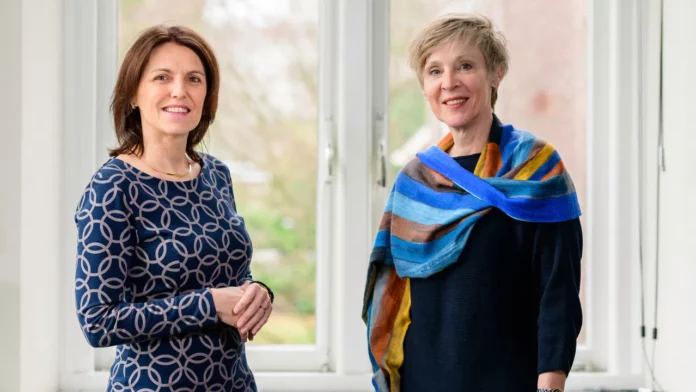
Calm has been restored at GGzE in the past six months. With Carla van de Wiel, a new board chairperson was appointed in April and Ingrid Willems joined the board in May this year. Six months after their appointment, the directors are discussing the challenges they are facing at the GGzE.
Van de Wiel and Willems started at GGzE after a turbulent period in which the supervisory board, staff and client councils clashed over the suitable successor to Joep Verbugt.
That turmoil largely passed Van de Wiel by, allowing her to make a fresh start, she says. “I started with great pleasure. I received a warm welcome from everyone here and everyone is happy to have a permanent board again. Our sights are set on the future once more and we are happy that as GGzE we can focus on care again.”
Challenge
This focus is necessary because the care institution faces considerable challenges. “There is a shortage of care professionals. We have to keep offerring our current level of care while the demand is growing. The biggest challenge is to maintain the level of care while fewer and fewer staff are available,” says Van de Wiel.
“Moreover, it is not a money issue. All healthcare institutions have the same problem. So we can that we are going to do everything we can to bring in enough people but this means they will be short of staff elsewhere” says the board chairman. “That’s why we have to solve the problem together.”
Focus
Part of the staffing problem can be solved by being more selective in who needs treatment from the mental health service, Willems believes. “We need to sharpen our focus. Our specialists are very good at treating psychiatric disorders or complaints. However, sometimes people’s problems stem from factors the GGZe cannot change. Such factors may be housing problems, financial problems or domestic problems.”
‘Misunderstood’
In this way, people who display confused behaviour in public, for example, can also get more adequate help, says Van de Wiel. “We prefer to call those people ‘misunderstood’. This ensures that we can have a good dialogue and talk to the police and the GGD, for example. Some of the people with misunderstood behaviour do indeed need to go to GGzE, but some do not. Those people just need a roof over their heads, or just someone to listen to them.
Addressing the cause
For many people with mental health problems, the approach needs to be better linked to other institutions, the directors say. “Such other parties may be the municipality, the social domain and other healthcare institutions,” Willems says. “That means that in some cases we should not treat the depression, but address the causes of that depression. That should be much more the focus in the collaboration, so that that person doesn’t end up here to begin with.”
Such an approach also requires a culture change, the director believes. “We cannot solve it with professional help alone,” Willems reveals. “It’s about co-reliance: how can we cope with some problems in the neighbourhood? Of course, it is true that you cannot make people who are sick better in the neighbourhood. Professionals have to do that. However, a joint approach is better for a lot of other problems.”
A caring society
“In recent years, we have been increasingly thrown back on ourselves in a very fast-paced society that not everyone can keep up with. We will have to look after each other more again. Such care was necessary during the Covid pandemic but we will also have to learn to do care for eachother without a crisis. We should also expect that from each other.”
Psychiatry training
Last year, it was also revealed that GGzE’s psychiatry training programme was not up to standard. This was followed by a reprimand from the RGS supervisor. After it became known that the training could go ahead after all, another year under RGS supervision followed. That year ended in November. “We recently had a final inspection. A decision from the RGS will follow in January, but we have no reason to assume that the programme will not get definitive approval,” says Carla van de Wiel.
Source: Studio040
Translated by: Shanthi Ramani















